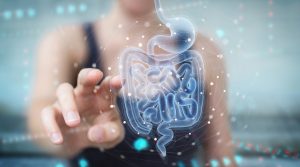
You know gut health is important…but how do you know what is “normal” and what isn’t? The medical professionals at Gastrointestinal Specialists, P.C., are busting some common myths about the ins and outs of your digestive health.
1. I don’t have symptoms, so I don’t need a colonoscopy. FALSE!
All feels right in your gastrointestinal tract, so why bother getting a colonoscopy? Don’t make this mistake. If you’re 45 or older (or have risk factors), you need to get a colonoscopy.
It can take years for colon cancer to develop – and you may not have symptoms until then – but a colonoscopy can detect and remove polyps that can develop into cancer before you even feel anything is amiss.
It’s kind of like running your snowblower before the first snow of the year: It was working fine last year, so you just want to make sure it still is…before the snow hits. Having a colonoscopy means you can find those silent polyps now, while everything is feeling fine…and remove them before they develop into cancer.
2. Everyone gets heartburn; it’s no big deal. FALSE!
You may have felt the burning sensation in your chest, or you may have seen someone else cringing while they hold their hand to their own chest. “It’s just heartburn,” you tell yourself…because you’ve seen others with it and know all about the over-the-counter medications for it.
But it’s not “just” heartburn. It’s not something that “just” happens. And prolonged bouts of heartburn can cause serious damage.
Chronic heartburn can be a sign of Gastroesophageal Reflux Disease – more commonly known as GERD. When your stomach acids build up, they can extend into your esophagus (which connects your stomach to your mouth). This acid reflux can cause the burning sensation in what feels like your throat and chest: Heartburn.
Those stomach acids can damage your esophagus – so the heartburn you’re feeling is a sign that something isn’t right. Left untreated over time, it can cause difficulty in swallowing – and puts you at higher risk to develop Barrett’s esophagus and esophageal cancer. Getting diagnosed and treated can prevent further damage.
3. I’m “regular,” so I don’t need fiber. FALSE!
Fiber helps move waste through your system more smoothly. It seems you don’t have any issues there since you’re not dealing with constipation or diarrhea, so you assume what you’re doing is working, right?
And it just may be – but that doesn’t mean you don’t need to be conscious of how much fiber you’re consuming. You want to make sure you have enough fiber in your diet, for more reasons than bathroom ease.
Fiber helps to clean out your digestive system, especially your colon. It helps move waste through more quickly, so it’s not gathering in your intestines for too long.
Fiber helps strengthen your colon wall, making it better equipped to prevent and deal with health conditions like diverticulitis.
Fiber helps you feel full, so it can help keep you at a healthy weight and thus at a lower risk of disease.
Many people don’t intake as much fiber as they should: The Mayo Clinic recommends men ages 50 and older have 38 grams of fiber daily; for women ages 50 and older the recommendation is 25 grams. Just make sure to gradually increase your fiber intake to minimize potential bloating and gas.
4. Fiber tastes awful, so I can just take a supplement instead. FALSE!
After doing a little thinking, you decide maybe you can benefit from more fiber in your life. But you don’t want to resort to bran flakes for breakfast, beans for lunch, and prunes for snack…so you figure a fiber supplement will work just fine. However, including fiber foods in your diet is a better alternative – and it doesn’t mean you’ll be eating bland foods.
Fiber foods are better than supplements because you’ll also be benefitting from the other vitamins and minerals that fiber-rich foods provide (because your diet can help any colon issues you may have).
To easily add more fiber, swap out refined grains for whole grains and read labels to incorporate foods with higher fiber content. Plus, fruits and vegetables make great sources of fiber: Like apples, broccoli, avocado, and berries.
Sometimes, however, a fiber supplement may be your best option to bring more fiber into your diet. Before you add a fiber supplement, talk to your doctor.
5. Stomach upset is a normal part of life and it will pass. FALSE!
Sure, sometimes we eat foods we know we shouldn’t – or we overindulge and know the cause of our sudden bloat or uncomfortableness – but even so, we’re not supposed to feel pain when we eat.
You may tell yourself, “I know I’m not eating only fruits and vegetables all day, and if I was, then I’d feel better.” However, the digestive pain you’re feeling may not be the result of what you just ate.
For instance, diverticulitis is when parts of your colon become inflamed – and that can cause abdominal pain, nausea, fever, constipation, and diarrhea.
Anytime you have stomach pain, it’s best to consult with your doctor to determine the cause – and to treat the problem so you feel better and things don’t get worse.
Schedule an appointment with Gastrointestinal Specialists, P.C.
If you have any concerns about your gut health – or need to schedule a colonoscopy – take the time today to contact Gastrointestinal Specialists, P.C. in Troy, Michigan. We can determine and treat the cause of your health issues, so you can feel better.